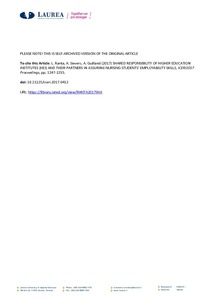Shared responsibility of higher education institutes (HEI) and their partners in assuring nursing students' employability skills
Ranta, Liisa; Sievers, Anna; Guilland, Auli (2017)
Ranta, Liisa
Sievers, Anna
Guilland, Auli
International Academy of Technology, Education and Development
2017
Julkaisun pysyvä osoite on
https://urn.fi/URN:NBN:fi:amk-2017121421425
https://urn.fi/URN:NBN:fi:amk-2017121421425
Tiivistelmä
Considerable technological changes have modified our world during the last centuries. Jobs and their content evolve with such a space that anticipation of future skills requirements is extremely challenging. Huge expectation are set on education in bringing the appropriate solutions. Especially higher education (HE) should assure that graduates are agile, have a solid understanding of how the workplaces work. Graduates should be prepared see how their skills fit into to the changing environments of working life and for moving across jobs and sectors.
The challenges of higher education are not limited to the changing requirements of working life. Also the learners and their expectations and practices have changed. Most adult learners benefit from internet to find and make use of information on their own. People tend to avoid long, drawn out courses that take time to work through, and prefer to use short pieces of content – both instructional and informational – and share ideas and information with others. Learning happens much outside the classroom by being immersed in work or in social networks, gradually assimilating new ideas and experiences, in many instances unintentionally and without even realising it. Formal learning should adapt to the wave and adjust the offering to the real-life context of the learners. Digitalisation including eLearning needs to be developed as an essential part of higher education.
The goal of this study was to increase knowledge on the competences needed in different working environments of nurses and to improve nursing students’ employability skills. Fifteen private, public and third sector nurses’ employers were interviewed in Southern Finland. The EntreComp Framework was used in the interviews which were audio-video recorded.
The most essential competences of nurses turned out to be:
1) mobilizing recourses (e.g. evidence-based nursing and clinical nursing skills),
2) mobilizing others (e.g. interaction skills),
3) taking the initiative (e.g. initiative, independency, professionality),
4) coping with uncertainty, ambiguity and risk (e.g. decision making, acting under pressure and stress) and
5) working with others (e.g. team-working, co-operation).
In the future the special attention needs e.g. language skills, technological skills, knowledge searching skills, multicultural skills, ability to comply with changes, interaction and guiding skills and knowledge to care for different patient groups.
To succeed in answering to the changing requirements of working-life, business and universities should share the responsibility and create awareness on both sides of the complexities of the other. This collaboration should also enable development of internships which really enable students to develop their skills in various aspects and learn to take over responsibilities are important pathways.
Students should recognise their own role and responsibility and take an active role in learning and develop their ability to assess their performance and match it to those of the field where they wish to work.
Higher education should act as a facilitator of learning in the collaboration where all partners, education, business and learners, assure their active role and responsibilities. This is this only way how the challenges of future working-life skills can be assured efficiently.
The challenges of higher education are not limited to the changing requirements of working life. Also the learners and their expectations and practices have changed. Most adult learners benefit from internet to find and make use of information on their own. People tend to avoid long, drawn out courses that take time to work through, and prefer to use short pieces of content – both instructional and informational – and share ideas and information with others. Learning happens much outside the classroom by being immersed in work or in social networks, gradually assimilating new ideas and experiences, in many instances unintentionally and without even realising it. Formal learning should adapt to the wave and adjust the offering to the real-life context of the learners. Digitalisation including eLearning needs to be developed as an essential part of higher education.
The goal of this study was to increase knowledge on the competences needed in different working environments of nurses and to improve nursing students’ employability skills. Fifteen private, public and third sector nurses’ employers were interviewed in Southern Finland. The EntreComp Framework was used in the interviews which were audio-video recorded.
The most essential competences of nurses turned out to be:
1) mobilizing recourses (e.g. evidence-based nursing and clinical nursing skills),
2) mobilizing others (e.g. interaction skills),
3) taking the initiative (e.g. initiative, independency, professionality),
4) coping with uncertainty, ambiguity and risk (e.g. decision making, acting under pressure and stress) and
5) working with others (e.g. team-working, co-operation).
In the future the special attention needs e.g. language skills, technological skills, knowledge searching skills, multicultural skills, ability to comply with changes, interaction and guiding skills and knowledge to care for different patient groups.
To succeed in answering to the changing requirements of working-life, business and universities should share the responsibility and create awareness on both sides of the complexities of the other. This collaboration should also enable development of internships which really enable students to develop their skills in various aspects and learn to take over responsibilities are important pathways.
Students should recognise their own role and responsibility and take an active role in learning and develop their ability to assess their performance and match it to those of the field where they wish to work.
Higher education should act as a facilitator of learning in the collaboration where all partners, education, business and learners, assure their active role and responsibilities. This is this only way how the challenges of future working-life skills can be assured efficiently.
